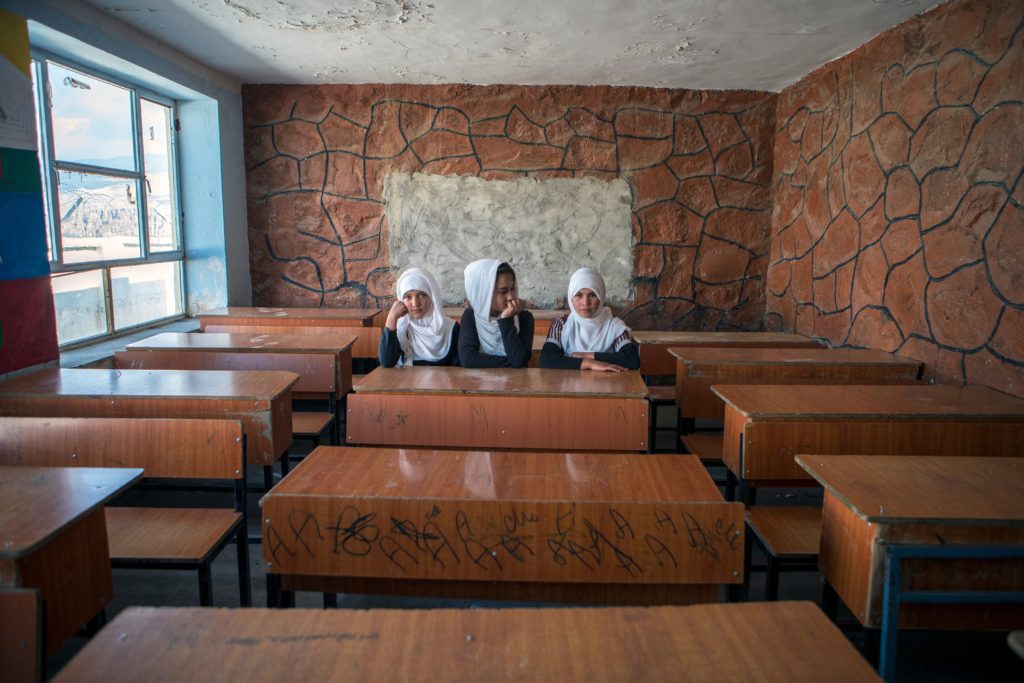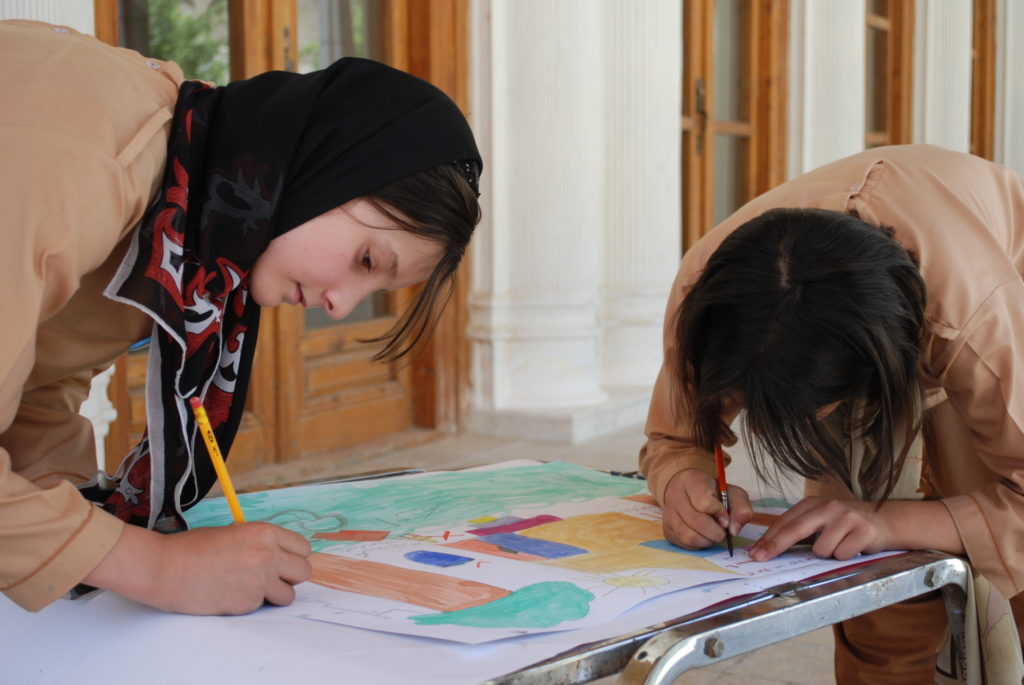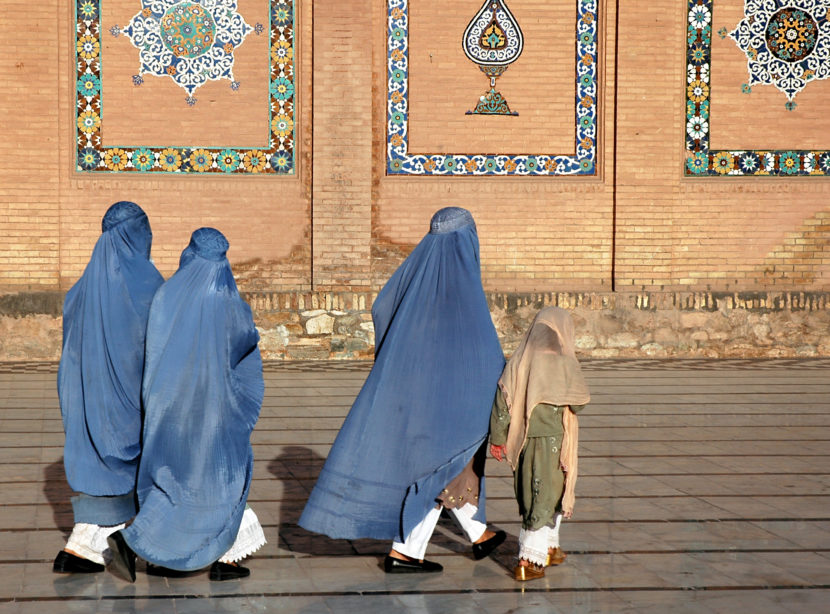Afghanistan is a country that boasts a rich culture and magnificent landscapes but that also is the land of people who have endured immense hardship. The Taliban’s return to power in 2021 has brought Afghanistan to the centre of human rights concerns. Economic crisis, poverty, famine, and children’s imperilled livelihoods form part of the takeover aftermath. Impoverished, famished, overworked and displaced, Afghan children are distressed. Young Afghan girls are disproportionately targeted by the Taliban regime and are consequently, most concernedly, victims of an education ban and of child, early, and forced marriages.
Afghanistan’s past tumult leading to the 2021 Taliban takeover
As a country situated in South-Central Asia, Afghanistan was along trade routes which connected Southern, Eastern Asia to Europe and to the Middle East, and this placed Afghanistan as a country prone to be sought after by surrounding empires (Encyclopædia Britannica, 2023). In the 20th century, Afghanistan suffered a civil war, which was “greatly exacerbated by a military invasion and occupation by the Soviet Union” from 1979 to 1989 (Encyclopædia Britannica, 2023).
Further armed conflicts occurred, between a surviving Afghan communist regime and Islamic insurgents, followed by a brief rule by the mujahideen groups up until the Taliban rose to power between 1996 and 2001 (Encyclopædia Britannica, 2023). The Taliban then fell under the group led by Osama bin Laden (Encyclopædia Britannica, 2023). Following the 9/11 attacks, Americans started bombing numerous Taliban targets and bases (PBS News Hour, 2021).
Conflicts continued afterwards between the Taliban, al-Qaida fighters and the Afghan government forces, and it was during that time, in May 2011 to be precise, that Osama bin Laden was killed by the U.S. forces (PBS News Hour, 2021). It was then in August 2021 that the Taliban took over Kabul for good. This opportunity for the Taliban came in following the collapse of the Afghan government and briefly after the withdrawal of U.S. troops from the Afghan territory (PBS News Hour, 2021).
Afghanistan’s obligations under international law
Afghanistan officially joined the United Nations on 19 November 1946 (United Nations, n.d.). Afghanistan has signed and ratified, inter alia, the Convention on the Rights of the Child (‘CRC’) in 1994 and its two optional protocols in, respectively, 2002 and 2003 (United Nations Treaty Body Database).
Furthermore, Afghanistan also signed and ratified the Convention on the Elimination of All Forms of Discrimination against Women (‘CEDAW’) in 2003 (United Nations Treaty Body Database). As such, Afghanistan must protect all Afghan children, women, and girls, and must respect and fulfil their human rights as enshrined in the CEDAW and the CRC (United Nations OHCHR, 2021).
According to the CEDAW, Afghanistan, as a State Party, must condemn any form of discrimination against women and “shall take all appropriate measures to eliminate discrimination against women” in the field of education, in the field of health care and in “all matters relating to marriage and family relations” (Convention on the Elimination of All Forms of Discrimination against Women, 1981).
According to the CRC, every child has the right to life, right to health, right to education and right to protection, including from “all forms of physical or mental violence, injury or abuse, neglect or negligent treatment, maltreatment or exploitation”, and sexual abuse (Convention on the Rights of the Child, 1990).
A breaking point for children in Afghanistan
The Taliban takeover followed an economic and food crisis gravely affecting Afghan families and their children (Save the Children, 2022). This can be explained by the fact that the Taliban were afflicted with global but also national sanctions which then complicated the existing humanitarian aid and efforts; and by the fact that the international community, which at some point contributed around 80% of the entirety of the Afghan government spending budget, had cut off or slowed any development assistance that could be brought to Afghanistan (Save the Children, 2022).
Consequently, at least 96% of Afghan households have lost part or all of their income in comparison to 2021, and Afghan families became severely impoverished (Save the Children, 2022). The United Nations has warned that “six million people were at risk of famine” (Aljazeera, 2022).
Toppling the poverty and famine hitting Afghanistan, came the problem of child labour. Indeed, young boys and girls are pushed out of schools and into child labour which includes various forms of dangerous and harmful work and in some cases, children are sent to work in another country or away from their families (Save the Children, 2022). It has been estimated that around one million children are currently “engaged in child labour in Afghanistan” (Aljazeera, 2022).
The number of impoverished, famished, overworked and displaced children is on the rise in Afghanistan, to the point where the human rights and humanitarian situation has reached distressing and severe proportions. While this is already alarming, the circumstances surrounding Afghan girls in this particular context are even direr.
Afghan girls disproportionately targeted
While Afghan girls suffer from the same hardships as their male counterparts, they suffer additionally from distinct human rights violations, due to gender discrimination. Indeed, since the takeover, the Taliban have imposed “a long and growing list of rules and policies that comprehensively prevent women and girls from exercising their fundamental rights, including to expression, movement, (…), and education affecting virtually all their rights, including to life, livelihood, shelter, health care, food, and water” (Human Rights Watch, 2022).

One of the policies preventing girls from exercising their fundamental rights lies in the Taliban barring girls from attending school or resuming their education. In March 2022, the Taliban declared that women and girls would “continue to be barred from secondary education” (Human Rights Watch, 2022). Prior to the Taliban takeover in Afghanistan, an estimated 3.7 million children remained out of school – the majority of whom were girls (Malala Fund, n.d.). In the intervening years of the Taliban takeover, the regime has denied secondary school education to an additional 1,254,473 Afghan girls (Malala Fund, n.d.).
“Decades of progress on gender equality and women’s rights have been wiped out in mere months. We must continue to act together, united in our insistence on guarantees of respect for the full spectrum of women’s rights.”
– Sima Bahous, United Nations Women Executive Director (United Nations Women, 2022).
Moreover, the rates of child, early and forced marriages are surging under the Taliban rule (Amnesty International, 2022). Indeed, Afghan girls are either being forced by their families, due to lack of income or poverty, to marry Taliban members or the Taliban members themselves are “forcing women and girls to marry them” (Save the Children, 2022; Amnesty International, 2022).
Girls’ and women’s human rights situation cries for drastic change
Afghan girls have been and are being blatantly denied their fundamental human rights, such as their right to education, to the highest attainable standard of physical and mental health, freedom of movement and their right to non-discrimination (United Nations OHCHR, 2023). Afghan girls must continue to benefit from the robust and unwavering support of the international community, which in turn must:
- Reaffirm its commitment and to take “concrete actions to support and realise the rights of women and girls in Afghanistan, in particular, their right to education” (United Nations OHCHR, 2023).
- Prioritise the rights of girls “in all their engagements with the de facto authorities and demand the immediate reversal of edicts and policies that assault women’s and girls’ rights” (United Nations OHCHR, 2023).
- Develop and implement urgently “a robust and coordinated strategy” that will pressure the Taliban into bringing changes to girls’ human rights (Amnesty International, 2022).

Humanium, as a child-right organization actively conducting numerous projects worldwide, remains committed to safeguarding children’s human rights, including girls’ rights to life, protection, and education. If you want to contribute to Humanium’s cause, please consider making a donation, volunteering or becoming a member.
Written by Moïra Phuöng Van de Poël
Bibliography:
Aljazeera. (2022, February 14). Estimated one million Afghan children engaged in labour: NGO. Retrieved from Aljazeera at https://www.aljazeera.com/news/2022/2/14/one-million-children-in-afghanistan-engaged-in-labour-ngo, accessed in July 2023.
Aljazeera. (2022, August 30). UN says six million Afghans are at risk of famine as crises grow. Retrieved from Aljazeera at https://www.aljazeera.com/news/2022/8/30/un-warns-6-million-afghans-at-risk-of-famine-as-crises-grow, accessed in July 2023.
Amnesty International. (2022, July 27). Afghanistan: Taliban’s ‘suffocating crackdown’ destroying lives of women and girls – new report. Retrieved from Amnesty International: https://www.amnesty.org/en/latest/news/2022/07/afghanistan-talibans-suffocating-crackdown-destroying-lives-of-women-and-girls-new-report/#:~:text=July%2027%2C%202022-,Afghanistan%3A%20Taliban’s%20’suffocating%20crackdown’%20destroying%20lives%20of,women%2, accessed in July 2023.
Encyclopædia Britannica. (2023, July 7). Afghanistan. Retrieved from Encyclopædia Britannica at https://www.britannica.com/place/Afghanistan, accessed in July 2023.
Human Rights Watch. (2022). Afghanistan Events of 2022. Retrieved from Human Rights Watch at https://www.hrw.org/world-report/2023/country-chapters/afghanistan, accessed in July 2023.
Malala Fund. (n.d.). Afghanistan is the only country in the world that forbids girls to go school. Retrieved from Malala Fund at https://malala.org/countries/afghanistan, accessed in July 2023.
PBS News Hour. (2021, August 30). A historical timeline of Afghanistan. Retrieved from PBS News Hour at https://www.pbs.org/newshour/politics/asia-jan-june11-timeline-afghanistan, accessed in July 2023.
Save the Children. (2022, August 10). Breaking point: Children’s lives one year under Taliban rule. Retrieved from Save the Children at https://resourcecentre.savethechildren.net/pdf/Breaking-Point-Childrens-lives-one-year-under-Taliban-rule_Aug-2022.pdf/, accessed in July 2023.
United Nations General Assembly. (1981, September 3). Convention on the Elimination of All Forms of Discrimination against Women. Retrieved from United Nations General Assembly at https://www.ohchr.org/sites/default/files/Documents/ProfessionalInterest/cedaw.pdf, accessed in July 2023.
United Nations General Assembly. (1990, September 2). Convention on the Rights of the Child. Retrieved from United Nations General Assembly at https://www.ohchr.org/sites/default/files/Documents/ProfessionalInterest/crc.pdf, accessed in July 2023.
United Nations OHCHR. (2021, August 30). Afghanistan: UN committees urge Taliban to honour their promises to protect women and girls. Retrieved from United Nations OHCHR at https://www.ohchr.org/en/press-releases/2021/08/afghanistan-un-committees-urge-taliban-honour-their-promises-protect-women, accessed in July 2023.
United Nations OHCHR. (2023, March 8). Afghanistan: UN experts say 20 years of progress for women and girls’ rights erased since Taliban takeover. Retrieved from United Nations OHCHR at https://www.ohchr.org/en/press-releases/2023/03/afghanistan-un-experts-say-20-years-progress-women-and-girls-rights-erased, accessed in July 2023.
United Nations. (n.d.). The United Nations in Afghanistan. Retrieved from United Nations at https://afghanistan.un.org/en/about/about-the-un#:~:text=Afghanistan%20officially%20joined%20the%20United,its%20diverse%20and%20unique%20culture, accessed in July 2023.
United Nations Treaty Body Database. (n.d.). Ratification Status for Afghanistan. Retrieved from United Nations Treaty Body Database at https://tbinternet.ohchr.org/_layouts/15/TreatyBodyExternal/Treaty.aspx?CountryID=1&Lang=EN, accessed in July 2023.
United Nations Women. (2022, August 15). In focus: Women in Afghanistan one year after the Taliban takeover. Retrieved from United Nations Women at https://www.unwomen.org/en/news-stories/in-focus/2022/08/in-focus-women-in-afghanistan-one-year-after-the-taliban-takeover, accessed in July 2023.


